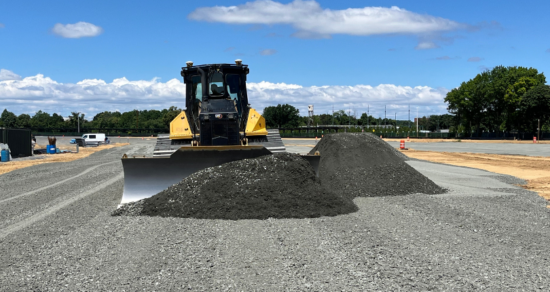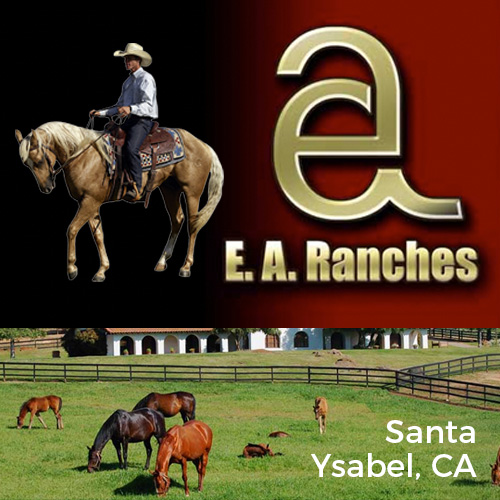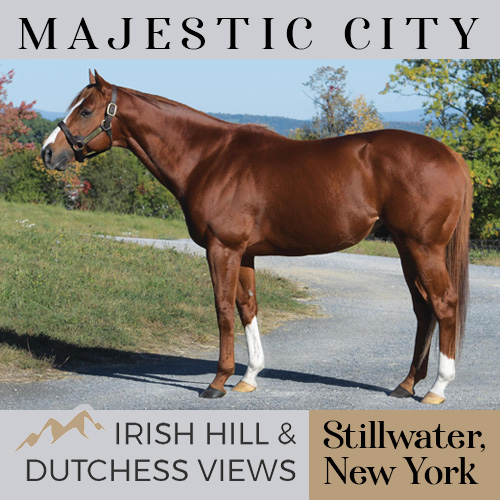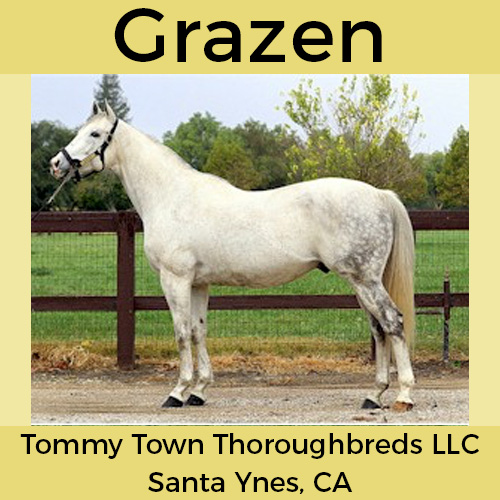Belmont Winter Racing to be Exclusively on Tapeta Track
 Edited Press Release, NYRA: Although race dates for 2026-27 are still to be determined, NYRA anticipates this change will amount to approximately three months of racing exclusively on an all-weather surface. This reflects NYRA’s commitment to improving all aspects of winter racing at the new Belmont Park. Shifting from dirt to the all-weather in the winter months will enhance equine safety and provide additional opportunities for NYRA’s year-round horse population for the benefit of the state’s thoroughbred racing ecosystem.
Edited Press Release, NYRA: Although race dates for 2026-27 are still to be determined, NYRA anticipates this change will amount to approximately three months of racing exclusively on an all-weather surface. This reflects NYRA’s commitment to improving all aspects of winter racing at the new Belmont Park. Shifting from dirt to the all-weather in the winter months will enhance equine safety and provide additional opportunities for NYRA’s year-round horse population for the benefit of the state’s thoroughbred racing ecosystem.
“At its core, our vision for the new Belmont Park is centered around modernizing racing and training facilities in ways that will ensure the sport’s continued success and future growth,” said Dave O’Rourke, NYRA President & CEO. “NYRA has closely tracked the evolution and application of synthetic surfaces, and the relevant data unequivocally supports a shift to the all-weather surface during the winter months.
“Together with the renovated main track and two new turf courses, Belmont Park will provide a multitude of quality options for both training and racing throughout the year,” added O’Rourke. “We will continue to work closely with New York’s horsemen and breeders to ensure a smooth transition as the new facility takes shape.”
In preparation for the consolidation of downstate racing operations at Belmont Park in 2026, NYRA is undertaking a complete evaluation of its overnight and stakes programs to ensure high quality racing throughout the year.
This February, at the request of the Horseracing Integrity and Safety Authority (HISA), NYRA convened a group of leaders to form an All-Weather Surfaces Committee. The committee is chaired by O’Rourke and is tasked with evaluating the impact of various racing surfaces on equine injury rates while studying the feasibility of broader adoption of all-weather surfaces nationally.
“HISA commends NYRA for prioritizing horse safety in its decision to utilize an all-weather racing surface at Belmont Park for winter racing,” said Lisa Lazarus, HISA CEO. “NYRA has shown tremendous leadership through the research and analysis it has undertaken in making these important decisions for the future of the sport.”
In recent years, NYRA has invested in upgrades to a variety of racing and training facilities at Belmont Park, Aqueduct Racetrack and Saratoga Race Course. This includes the installation of an all-weather Tapeta surface over the Belmont Park pony track and the complete renovation of the main track and Oklahoma Training Track at Saratoga. At Aqueduct, NYRA has renovated the main track; replaced the inner dirt with a second turf course and added a new surface to the inner turf course all since 2017.
Following the installation of a limestone base topped by a clay pad, the dirt surfaces at Saratoga now respond exceedingly well to extreme weather while the clay pad offers a more forgiving surface. According to The Jockey Club Equine Injury Database, the dirt surfaces at Saratoga have been the statistically safest among NYRA tracks each year since 2021.
To achieve consistency with the dirt racing and training surfaces at Saratoga, the main track at the new Belmont Park will feature a limestone base topped with a clay pad below the racing surface itself. This structure has proven to be effective in the wide variety of weather conditions found at Saratoga from April through November and will be similarly beneficial for the main track surface at the new Belmont Park.
While the composition of the main track will not allow for its use during the winter months, the addition of the all-weather Tapeta track will allow NYRA to conduct winter racing over a surface optimized for the climate.
“The harmonization of NYRA’s dirt surfaces is yet another important equine safety measure in New York,” said Andrew Offerman, NYRA Senior Vice President of Racing and Operations. “Aligning the composition of the Belmont main track with both dirt surfaces at Saratoga will further NYRA’s ability to conduct world-class dirt racing in the spring, summer and fall.”
In addition to the construction of a new main track and all-weather Tapeta track, NYRA is currently renovating and expanding Belmont’s Widener and Inner turf courses. As a result, both courses will feature additional running lanes, modern drainage and a state-of-the-art irrigation system serviced by a new infield irrigation pond and on-site pump station.
The construction of four entirely new racing surfaces at Belmont is being overseen by Glen Kozak, NYRA Exec. Vice President for Operations & Capital Projects, who has managed the extensive track renovations at Aqueduct and Saratoga. In addition to Kozak and his internal team, NYRA relies on outside soil engineers and architects with surface analysis and testing provided by the University of Kentucky.
“This is a hugely significant project in NYRA’s history, and it’s an honor to be a part of something that will push the sport into the future,” said Kozak. “Our goal is to provide the highest quality and most consistent surfaces in racing, and we have assembled a team that will make that goal a reality.”
Despite the prominent role that New York-based trainers, owners and jockeys have played in the Breeders’ Cup World Championships, the event has not been held at Belmont Park since 2005 due to the antiquated infrastructure and lack of a fully winterized building. Upon completion of the new facility, the Breeders’ Cup has committed to adding Belmont Park to the rotation of host sites.
“We are very supportive of the Belmont Park renovation, particularly plans to put in place a world-class facility with fantastic racing surfaces that offer versatility and the ability to address various seasons and weather conditions,” said Drew Fleming, President & CEO of Breeders’ Cup Limited. “As we said before, if you build it, we will come. We look forward to working with the New York Racing Association to bring the Breeders’ Cup World Championships back to the Empire State when the time is right.”









